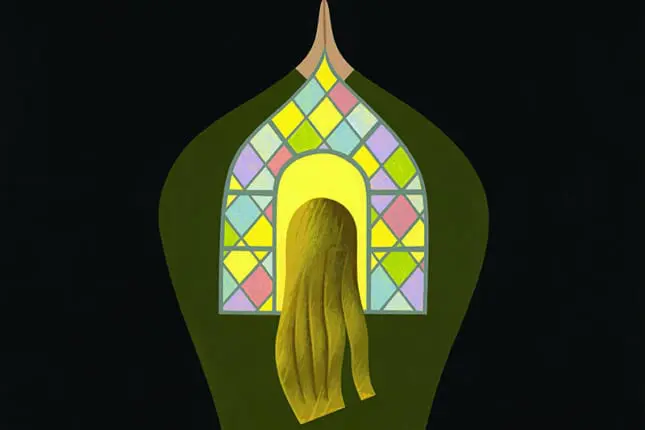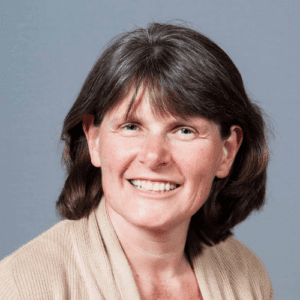Our family had driven past the historic church downtown countless times. It’d always looked so lovely from the outside, with its elegant steeple reaching skyward and dramatic stained-glass windows. But we’d never been inside until the warm Sunday when we passed through its weighty doors to attend the baptism of a friend’s infant daughter.
As we walked down the aisle, light filtered by the stained-glass streamed onto wooden pews ahead. It was a gorgeous sight, but I felt a little trepidatious. This was the first baptism I’d ever attended. Which pew were we supposed to sit in? Were we expected to be close to the front? Were we expected to sing? Would we be the only ones who didn’t know the words?
Once I’d chosen a pew, I felt calmer and grateful to be getting a glimpse into a world that was so important to our friends. To my surprise, my young kids sat patiently through the sermon. When it ended, the pastor, in a white robe and gold-edged vestments, closed the Bible, smiled widely, and invited our friends to bring their baby up to the baptismal font.
Suddenly, my four-year-old son exclaimed loudly, “Mom, who’s God?”
His words echoed to the domed ceiling, and heads swiveled to see what child had said such a thing. Maybe some in attendance thought it was funny, but I burned with embarrassment, imagining that most everyone there was judging me: How could that woman have a child who’s old enough to go to preschool but doesn’t know about God?
Several years later, my daughter, at age five, called me in tears to pick her up early from a sleepover. Once in the car, she blurted out, “Mom, what’s hell?”
As I struggled to formulate an answer, she explained that the other girls had asked what church she went to, and when she’d said she didn’t go to church, they’d gasped in unison. A couple of them had even cried. They were terrified, they’d told her, that she’d go to hell.
When we got home, my husband and I told her we wished they hadn’t been so scared for her, and explained how everyone just has different beliefs. “Honey,” I said, “it sounds like your friends have been taught certain ideas, but we have a different way of looking at the world, and that’s okay. People find many ways to climb the mountain of life.”
My parents had largely rejected the doctrines of their Christian faith. As an adult, I’d found myself drawn to Buddhist teachings, but wasn’t keen to identify with any organized religion. My husband, whose German-Jewish father had experienced the perils of religious persecution firsthand, also shied away from organized religion. When we became parents, we’d vowed to expose our children to different religious traditions and have discussions with them about the importance of religious tolerance. We told ourselves they could choose their own views on religion when they became adults, but deep down I now believe we were hoping they’d be agnostic like us.

By the time my son was a teenager, he’d gotten clear on who God is and was plenty comfortable with our agnosticism. My daughter, in contrast, was not. At 14, she’d started seriously dating a guy who attended church regularly, and we’d begun to notice signs that she might be adopting his beliefs.
To start, she wore a necklace strung with a cross that she never took off, and she hung posters with Bible verses on her bedroom walls. Next, she began studying the Bible for hours a day: in her room, in the car, even at the dining-room table. She read it so voraciously that initially we thought she’d discovered a new teen series, one all her friends must be similarly obsessed with. Eventually, we noticed her bowing her head to pray in silence while the rest of us dug into our evening meals. Then came the requests to go on mission trips and church lock-ins, where she could spend time with other religious teens, sometimes all night.
Even as evidence of her conversion mounted, my husband and I were convinced she was just going through a phase. But there were nights, behind our bedroom door, when one of us would ask, “How did this happen? What are we supposed to do?” Neither of us had a viable answer: we’d just reassure each other that the phase would end.
Except it didn’t. Her commitment to evangelical Christianity hasn’t wavered in the ensuing years, and that’s led to many difficult discussions marked by tears, misunderstandings, and missteps—from all of us. I’ll never forget hearing myself say to her, “Don’t you think it’s a good idea to have sex before marriage?” More than once, she’s told me, “Mom, I’m scared you’re going to hell.”
The truth is I’m scared, too—but not of hell. I’m scared of this all-consuming religious path she’s chosen that’s so different from mine. I’m scared of her conservative beliefs, which, because they’re so foreign to me, may make her unreachable. At first, my husband and I wondered where we may have gone wrong as parents who simply tried to instill open-mindedness in their children, but now I wonder whether I’m truly open-minded and tolerant if I really feel this way about my daughter’s choices.
I’d always pictured myself as the kind of parent who’d be able to handle deftly all the twists and turns that come with guiding children into adulthood. If my child came out as gay or transgender, I knew I’d be loud and proud about my support. If they kept breaking curfew or started experimenting with drugs, I’d stay stalwart and loving, even as I enforced limits to keep them safe.
In all my years of anticipating potential issues and possible resolutions, it had never occurred to me that religious differences could be the thing that’d nearly derail us—but my daughter has taught me it’s a lot easier to be tolerant of others’ religions (or push others to practice tolerance) when it’s happening outside your immediate family.

My daughter is now married to the kind, gentle, faithful guy she met in high school, and religion remains central to their lives. I’m happy that formalizing their union was so meaningful for her, but the wedding was complicated for me. She and I had no difficulties working on the details of the decorations, music, and guest list, but she understandably didn’t involve me in the planning of the ceremony. Helping her hang a seven-foot cross in the outdoor space where guests gathered felt surreal to me, but we made sure it was solidly in place. At the reception, I’d envisioned guests having the option to join in a champagne toast, but her vision didn’t include serving alcohol. Throughout the process, I kept telling myself that this was what she and her partner wanted. It was their wedding and their life.
I don’t know how the significant differences between my daughter and me will affect our lives in the coming years. For now, just being present with our religious points of divergence has fostered growth for us. I suspect holiday gatherings, babysitting for future grandchildren, and mission trips to faraway countries will stir up mutual feelings of insecurity and awkwardness, but knowing I need to show up positively for one of the most important relationships in my life has helped me stay focused on the process of working through differences in an openhearted, loving way.
Just as I’ve advised many families in my therapy office who’ve needed to navigate political divides to practice radical acceptance, I’ve had to be willing to accept the differences between my daughter’s beliefs and mine—and prioritize the relationship between us.
As our story continues to unfold, I’m trying to recognize her courage in choosing her own way; that by deciding to devote herself to something that her family doesn’t embrace, she’s empowering herself; and that she and I—and all of us really—are forever on a path, not just of individuating, but of practicing true coexistence.

Recently, my husband and I took a long road trip through Iceland with my daughter, her husband, and our son. It was the first vacation we’d taken together since the wedding, and I think we were all feeling nervous as we piled into the rental car in this new land.
We all looked forward to the waterfalls, hot springs, black-sand beaches, puffins, and glaciers, but when I’d made the lodging arrangements before we left, I’d found myself curious about how relational dynamics would go—not only between us and our daughter, but also between our two children and my son and my new son-in-law.
Indeed, we faced a few awkward situations. For one, my daughter and son-in-law would periodically pull out their Bible and read it silently together as we drove. Although the rest of us would’ve preferred to listen to music or maybe even a podcast, no one protested, not even my son, who’d glance at them briefly before going back to whatever game he was playing on his phone. When we’d stop for meals or pull out the sandwiches we’d packed for lunch, the two of them would hold hands and say grace while the rest of us waited to eat with our hands in our lap. Our first night in the Airbnb we shared, while we got ready for bed, they played loud Christian music on the radio, my daughter belting out the lyrics that she clearly knew by heart.
Still, the four of us managed to settle into being together, and even bond, as one Icelandic summer day turned into the next. We often stood together in awe, surveying the otherworldly landscapes in this new country: immense cascades of water, floating icebergs, and lava rocks strewn as far as the eye could see. If for them, these scenes were evidence of God’s glory, they made no attempt to convince us of it. Instead, we shared the experience together in other ways.
My daughter encouraged us to make a TikTok video, a compilation of each of us performing the same simple dance moves in front of different backgrounds. Despite the multiple retakes we all required, we found ourselves competing to be featured in the next scene, where we’d burst out laughing time and time again. On a few nights, we all played some of our favorite card games, like Exploding Kittens. This not-at-all Christlike game consists of devilishly knocking one another out by counting cards and inserting the “exploding” ones to coincide with someone’s turn. The mischievous banter that resulted reminded me of past family times, when concerns about our differences carried so much less weight.
Although the kids rolled their eyes when I pulled out the therapy-like discussion card game We’re Not Really Strangers—which includes questions like, “What about me is most strange or unfamiliar to you?”—I could see by the way they listened intently to one another’s answers that they were relishing this bonding opportunity.
For me, the intimacy of those nights and our extended time together was a great salve. It temporarily bridged some of our gaps and became the gift I felt we all needed. And it helped remind me that the five of us still have a common, loving, enjoyable connection, even when our individual worlds—with their assertions of heavens and hells versus “who really knows?”—seem far apart.
ILLUSTRATION BY ADAM NIKLEWICZ
Sandra Wartski
Sandra Wartski, PsyD, is a licensed psychologist. She’s been with a child and family group practice for 30 years in Raleigh, NC, specializing in relationship issues, mood disorders, anxiety, eating disorders, and crisis intervention.













